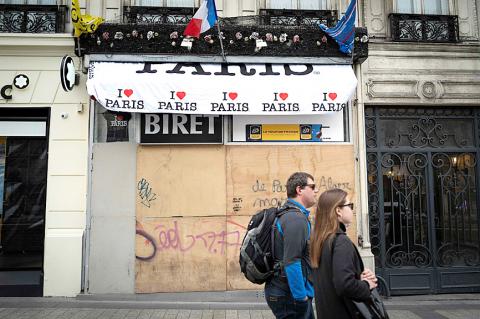France plans to mobilize 45 billion euros (US$50 billion) in crisis measures to help its companies, with the economy likely to shrink 1 percent this year due to the COVID-19 outbreak, French Minister of Finance Bruno Le Maire said yesterday.
A large part of the 45 billion euro figure was the deferral of all tax payments and payroll charges that companies were due to pay this month and the cancellation of such payments for firms at risk of collapse, Le Maire said.
“We are going to mobilize 45 billion euros as our first immediate economic assistance to companies,” Le Maire told French RTL radio. “We don’t want bankruptcies.”

Photo: AFP
The money comes in addition to 300 billion euros in government loan guarantees that French President Emmanuel Macron announced on Monday, Le Maire said.
He said that he would produce a new budget bill “in a matter of hours” to reflect fallout from the virus and based on a forecast that the economy would contract 1 percent this year.
Asked whether the stock market should be closed in light of the economic turmoil, Le Maire said that there were other things that could be done first, such as banning short-selling, which he said the markets regulator was doing for 24 hours.
Meanwhile, Airbus SE is stopping production and assembly activities at its plants in France and Spain for the next four days, as governments there implement new measures to restrict movements and fight the coronavirus outbreak, the planemaker said yesterday.
The move appears to mark the most serious across-the-board disruption in Airbus production since a strike at then British partner BAE Systems PLC in 1989, apart from problems with individual programs such as the Airbus A380 or A400M military aircraft.
“This will allow sufficient time to implement stringent health and safety conditions in terms of hygiene, cleaning and self-distancing, while improving the efficiency of operations under the new working conditions,” Airbus said in a statement.
Reuters on Monday reported that Airbus had drawn up contingency plans to slow or stop production if France was placed under a drastic lockdown due to the virus.
France’s aerospace capital of Toulouse is home to Airbus’ largest assembly plants as well its headquarters.
Factories in Britain, where Airbus makes wings, or Germany, where it has its second-largest cluster of assembly lines, could continue to operate for several days, but the rate at which they will produce parts and assemble jets has not been announced.
Deliveries have already been disrupted as crisis-hit airlines hold back from taking possession of aircraft to conserve cash, industry sources say.

Quanta Computer Inc (廣達) chairman Barry Lam (林百里) is expected to share his views about the artificial intelligence (AI) industry’s prospects during his speech at the company’s 37th anniversary ceremony, as AI servers have become a new growth engine for the equipment manufacturing service provider. Lam’s speech is much anticipated, as Quanta has risen as one of the world’s major AI server suppliers. The company reported a 30 percent year-on-year growth in consolidated revenue to NT$1.41 trillion (US$43.35 billion) last year, thanks to fast-growing demand for servers, especially those with AI capabilities. The company told investors in November last year that

Intel Corp has named Tasha Chuang (莊蓓瑜) to lead Intel Taiwan in a bid to reinforce relations between the company and its Taiwanese partners. The appointment of Chuang as general manager for Intel Taiwan takes effect on Thursday, the firm said in a statement yesterday. Chuang is to lead her team in Taiwan to pursue product development and sales growth in an effort to reinforce the company’s ties with its partners and clients, Intel said. Chuang was previously in charge of managing Intel’s ties with leading Taiwanese PC brand Asustek Computer Inc (華碩), which included helping Asustek strengthen its global businesses, the company

Taiwanese suppliers to Taiwan Semiconductor Manufacturing Co. (TSMC, 台積電) are expected to follow the contract chipmaker’s step to invest in the US, but their relocation may be seven to eight years away, Minister of Economic Affairs J.W. Kuo (郭智輝) said yesterday. When asked by opposition Chinese Nationalist Party (KMT) Legislator Niu Hsu-ting (牛煦庭) in the legislature about growing concerns that TSMC’s huge investments in the US will prompt its suppliers to follow suit, Kuo said based on the chipmaker’s current limited production volume, it is unlikely to lead its supply chain to go there for now. “Unless TSMC completes its planned six

Power supply and electronic components maker Delta Electronics Inc (台達電) yesterday said it plans to ship its new 1 megawatt charging systems for electric trucks and buses in the first half of next year at the earliest. The new charging piles, which deliver up to 1 megawatt of charging power, are designed for heavy-duty electric vehicles, and support a maximum current of 1,500 amperes and output of 1,250 volts, Delta said in a news release. “If everything goes smoothly, we could begin shipping those new charging systems as early as in the first half of next year,” a company official said. The new